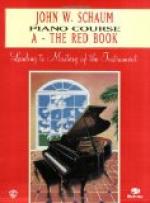Teresa Carreno asserts she had in the beginning many technical exercises which her teacher wrote out for her, from difficult passages taken from the great composers. There were hundreds of them, so many that it took just three days to go the rounds. She considers them invaluable, and constantly uses them in her own practise and in her teaching. Each exercise must be played in all keys and with every possible variety of touch and tone.
Paderewski gives much time daily to pure technic practise. He has been known to play scales and arpeggios in a single key for three quarters of an hour at a stretch. These were played with every variety of touch, velocity, dynamic shading and so on.
It is seen from the instances quoted that many great pianists believe in daily technic practise, or the study of pure technic apart from pieces. Many more testify that scales, chords, arpeggios and octaves constitute their daily bread. Some have spoken to me especially of octave practise as being eminently beneficial. They feel these things are essential to the acquiring of a fine technic, and keeping it up to concert pitch.
Some artists are partial to certain technical studies. Bachaus highly recommends those of Brahms, for instance. All artists use Bach in connection with their technic practise; in fact the works of Bach may be considered to embody pure technic principles, and pianists and teachers consider them a daily necessity.
INVENTING EXERCISES
Together with their studies in pure technic alone, the artists invent exercises out of the pieces they study, either by playing passages written for both hands with one hand, by turning single notes into octaves, by using more difficult fingering than necessary, thus bringing into use the weaker fingers, changing the rhythm, and in numerous other ways increasing the effort of performance, so that when the passage is played as originally written, it shall indeed seem like child’s play.
Another means to acquire technical mastery is through transposition. One would think Bach’s music difficult enough when performed as written, but the artists think nothing of putting it through the different keys. Burnham relates that during early lessons with Dr. Mason, that master gave him a Bach Invention to prepare, casually remarking it might be well to memorize it. The simple suggestion was more than sufficient, for the ambitious pupil presented himself at the next lesson with not only that particular Invention learned by heart, but likewise the whole set! De Pachmann, in his eagerness to master the technic and literature of the piano, says that when a Bach Prelude and Fugue was on one occasion assigned him by his teacher, he went home and learned the whole twenty-four, which he was able to play in every key for the next lesson!




